La Grande Illusion (1937)
Dir. Jean Renoir
Writ. Jean Renoir and Charles Spaak
w/ Erich von Stroheim, Jean Gabin, Pierre Fresnay, and Dita Parlo
Captain von Rauffenstein guns down Captain de Boldieu and Lieutenant Maréchal's fighter plane over German soil, then receives them at an impromptu lunch to honor the dead. Before the meal can be eaten the French officers, now prisoners of war, must leave for a soldier's camp in Hallbach where the German footsoldiers treat them with civilized military indifference. The French soldiers at the barracks when they arrive have made great use of their time digging a tunnel, and Boeldieu and Maréchal join in, all of them salivating over which appetite of freedom they will whet first. Endless fields of Holland tulips or a quiet glass of wine, each man deprived of such luxuries, spells his sense of beauty aloud, surrounded by the dank gray of isolation. Their common goal having formed them into a tight unit, their disappointment extinguishes their spirits when, on the morning of their planned escape, the news arrives that they will transfer to Wintersborn that afternoon. Any escape attempt by day would mean heavy loss of life, and they care too much about living to try.
At Wintersborn, Rauffenstein adresses the officers -- Boeldieu, Maréchal, and Rosenthal -- concerning the fortress' inescapability and binds them and himself to French regulations in light of their company's less solvent attempts to free themselves at Hallbach. The captains share a bond of the old nobility. They are gentlemen, a dying breed of a revolution based on the basic laws of supply and demand. Left on the shelf to gather dust, Boeldieu acts of his volition when he deems it best, contrary to the wishes of the aging German captain. At the essence of their differences lies the sharp dischord between acceptance of the need for change and rejection of the new sense of humanity. The future rests in the abilities of the commoners for whom Boeldieu lays down his life; for Rauffenstein, however, the only future clear to him are the orders he must give before he, too, can die.
As might be expected from the son of the impressionist, Renoir fills his canvas with the realities of the day-to-day living between members of opposing nations who adhere more naturally to the rules of courtesy than to the pretenses of war. The hypocrisy portrayed by these oppositions does not color the actions of the men who share its burden, for each man has needs and wants of his own. The motivation to live and to return -- to loved ones or to the front -- drives them; and, where no such motivation prevails, as in battle, men sacrifice themselves for those who have more to live for and more to lose. Operating on the belief that time spent with people, looking at and interacting with and appreciating, will always overrule spending time away in a charade as grand or illusory as war, Renoir gives each man a face and a voice and the proper amount of time in which to be seen and heard.
Amid the desires of the men to leave the camp, disparate views emerge from the French officers. Maréchal, a mechanic who deals in how-tos and questions his fellow man no further than to call him brother, believes that mankind can be saved, that it's not too late. War can be stopped, and the warmongers only win if man forgets his humor, his compassion, and his ability to connect. "We've got to end this damn war," he declares, "and make it the last." His companion in escape replies, "Don't delude yourself." To Rosenthal, war reeks of humanity's inability to recognize each other as important and part of a greater plan. Man always fouls the garden, falling further from rather than rushing toward the divine.
For Boeldieu nobility ceases to be a virtue only if he lets it and, though he distances himself from Rosenthal and Maréchal's ranks emotionally and intellectually, he doesn't think twice about paying the greatest price of all to ensure that the free world receives her native prodigal sons. Perhaps the most telling aspect of Renoir's examination of why, in the face of so much capability to get along peacably and still thrive, men still chase after grand illusions, it begs the question, are we truly free? And if so, then why are we so very alone?
Writ. Jean Renoir and Charles Spaak
w/ Erich von Stroheim, Jean Gabin, Pierre Fresnay, and Dita Parlo
Captain von Rauffenstein guns down Captain de Boldieu and Lieutenant Maréchal's fighter plane over German soil, then receives them at an impromptu lunch to honor the dead. Before the meal can be eaten the French officers, now prisoners of war, must leave for a soldier's camp in Hallbach where the German footsoldiers treat them with civilized military indifference. The French soldiers at the barracks when they arrive have made great use of their time digging a tunnel, and Boeldieu and Maréchal join in, all of them salivating over which appetite of freedom they will whet first. Endless fields of Holland tulips or a quiet glass of wine, each man deprived of such luxuries, spells his sense of beauty aloud, surrounded by the dank gray of isolation. Their common goal having formed them into a tight unit, their disappointment extinguishes their spirits when, on the morning of their planned escape, the news arrives that they will transfer to Wintersborn that afternoon. Any escape attempt by day would mean heavy loss of life, and they care too much about living to try.
At Wintersborn, Rauffenstein adresses the officers -- Boeldieu, Maréchal, and Rosenthal -- concerning the fortress' inescapability and binds them and himself to French regulations in light of their company's less solvent attempts to free themselves at Hallbach. The captains share a bond of the old nobility. They are gentlemen, a dying breed of a revolution based on the basic laws of supply and demand. Left on the shelf to gather dust, Boeldieu acts of his volition when he deems it best, contrary to the wishes of the aging German captain. At the essence of their differences lies the sharp dischord between acceptance of the need for change and rejection of the new sense of humanity. The future rests in the abilities of the commoners for whom Boeldieu lays down his life; for Rauffenstein, however, the only future clear to him are the orders he must give before he, too, can die.
As might be expected from the son of the impressionist, Renoir fills his canvas with the realities of the day-to-day living between members of opposing nations who adhere more naturally to the rules of courtesy than to the pretenses of war. The hypocrisy portrayed by these oppositions does not color the actions of the men who share its burden, for each man has needs and wants of his own. The motivation to live and to return -- to loved ones or to the front -- drives them; and, where no such motivation prevails, as in battle, men sacrifice themselves for those who have more to live for and more to lose. Operating on the belief that time spent with people, looking at and interacting with and appreciating, will always overrule spending time away in a charade as grand or illusory as war, Renoir gives each man a face and a voice and the proper amount of time in which to be seen and heard.
Amid the desires of the men to leave the camp, disparate views emerge from the French officers. Maréchal, a mechanic who deals in how-tos and questions his fellow man no further than to call him brother, believes that mankind can be saved, that it's not too late. War can be stopped, and the warmongers only win if man forgets his humor, his compassion, and his ability to connect. "We've got to end this damn war," he declares, "and make it the last." His companion in escape replies, "Don't delude yourself." To Rosenthal, war reeks of humanity's inability to recognize each other as important and part of a greater plan. Man always fouls the garden, falling further from rather than rushing toward the divine.
For Boeldieu nobility ceases to be a virtue only if he lets it and, though he distances himself from Rosenthal and Maréchal's ranks emotionally and intellectually, he doesn't think twice about paying the greatest price of all to ensure that the free world receives her native prodigal sons. Perhaps the most telling aspect of Renoir's examination of why, in the face of so much capability to get along peacably and still thrive, men still chase after grand illusions, it begs the question, are we truly free? And if so, then why are we so very alone?

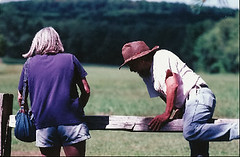
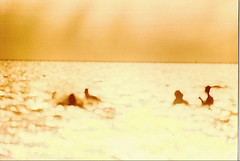
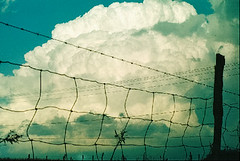
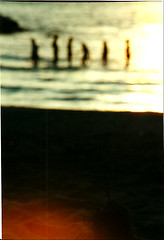
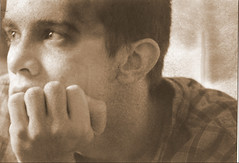
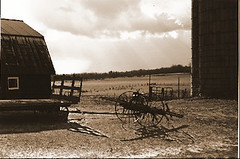
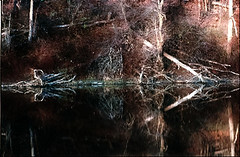






0 Comments:
Post a Comment
<< Home